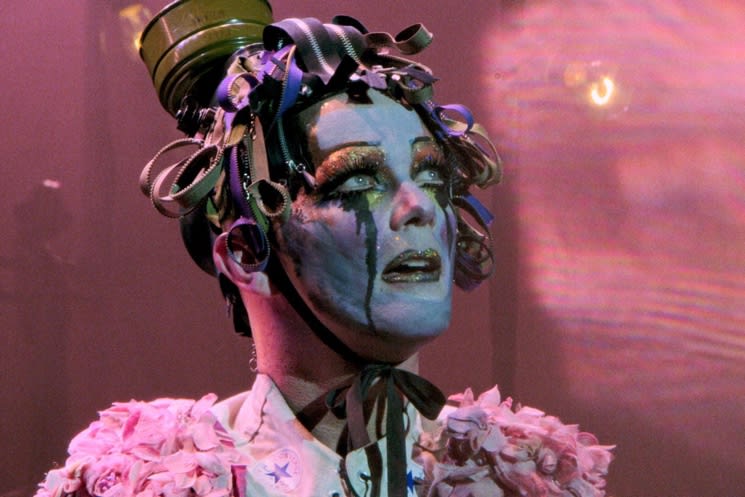In a world where the only plays getting mainstream attention are the splashy, expensive musicals on Broadway, it's easy to forget that theatre can be a powerful tool for activism. Poised to change this perception for good is HBO's documentary Taylor Mac's 24-Decade History of Popular Music.
Taylor Mac, a queer American artist, actor, playwright, singer-songwriter, producer and director, had a radical idea: a 24-hour show exploring the American identity through its music. Performed in front of a live audience in 2016 at St. Ann's Warehouse in Brooklyn, NY, Mac dubbed the project a "performance art concert." The one-and-done show featured 24 hour-long segments, each focusing on a specific decade spanning the country's history from 1776 to 2016. Complete with unique costumes marking each era, the concert was truly a once-in-a-lifetime experience for those involved.
Taylor Mac's 24-Decade History of Popular Music captures the spirit and message of the groundbreaking, Pulitzer Prize-nominated show, which has been condensed down to a 106-minute runtime. The cinematography for the live portions puts the viewer into the audience, providing a perspective of the on-stage action faithful to how it was intended to be experience. Talking head interviews interspersed throughout offer valuable commentary on the production, giving background context, Mac's personal history and the deeper message behind the performance art.
The documentary is equal parts beautiful and horrifying, solemn and hilarious, inspiring and harrowing. Mac puts America under the microscope, and doesn't hold back when delivering some harsh truths. Uncomfortable discussions about the nation's history of racism, homophobia and even ageism offer poignant insights without ever feeling preachy or dour. Empathy is a major theme throughout; rather than fostering a divisive us-versus-them mentality, the show encourages moving forward, together.
This "subjective take on history" makes effective use of excellent music and Mac's own undeniable charisma, encouraging audiences to learn from the past and change in the present. As Mac points out, "People love things that build communities." The problem is not being able to let go of these things despite knowing the foundation is evil — whether that's holding onto beloved songs with racist lyrics or supporting religious organizations that perpetuate harmful homophobic or transphobic rhetoric.
One of the most compelling aspects of Taylor Mac's show is the steady decrease in onstage participants as the show progresses. At the beginning, the orchestra offers a big, bold sound, but as the show goes on, the strength dwindles until the very last hour, eventually leaving the star on stage alone, exhausted from the gruelling performance. Mac describes this as an allegory for what the AIDS crisis did to the gay community, and its quiet effectiveness is palpable.
Taylor Mac's 24-Decade History of Popular Music is more than just queer performance art with a political lean — it's quirky, engaging, fun, funky and entertaining from beginning to end. Unfortunately, most of us will never get to experience something like the original stage performance, but thanks to this documentary, we can get a glimpse at what we've missed.
(Crave)Taylor Mac, a queer American artist, actor, playwright, singer-songwriter, producer and director, had a radical idea: a 24-hour show exploring the American identity through its music. Performed in front of a live audience in 2016 at St. Ann's Warehouse in Brooklyn, NY, Mac dubbed the project a "performance art concert." The one-and-done show featured 24 hour-long segments, each focusing on a specific decade spanning the country's history from 1776 to 2016. Complete with unique costumes marking each era, the concert was truly a once-in-a-lifetime experience for those involved.
Taylor Mac's 24-Decade History of Popular Music captures the spirit and message of the groundbreaking, Pulitzer Prize-nominated show, which has been condensed down to a 106-minute runtime. The cinematography for the live portions puts the viewer into the audience, providing a perspective of the on-stage action faithful to how it was intended to be experience. Talking head interviews interspersed throughout offer valuable commentary on the production, giving background context, Mac's personal history and the deeper message behind the performance art.
The documentary is equal parts beautiful and horrifying, solemn and hilarious, inspiring and harrowing. Mac puts America under the microscope, and doesn't hold back when delivering some harsh truths. Uncomfortable discussions about the nation's history of racism, homophobia and even ageism offer poignant insights without ever feeling preachy or dour. Empathy is a major theme throughout; rather than fostering a divisive us-versus-them mentality, the show encourages moving forward, together.
This "subjective take on history" makes effective use of excellent music and Mac's own undeniable charisma, encouraging audiences to learn from the past and change in the present. As Mac points out, "People love things that build communities." The problem is not being able to let go of these things despite knowing the foundation is evil — whether that's holding onto beloved songs with racist lyrics or supporting religious organizations that perpetuate harmful homophobic or transphobic rhetoric.
One of the most compelling aspects of Taylor Mac's show is the steady decrease in onstage participants as the show progresses. At the beginning, the orchestra offers a big, bold sound, but as the show goes on, the strength dwindles until the very last hour, eventually leaving the star on stage alone, exhausted from the gruelling performance. Mac describes this as an allegory for what the AIDS crisis did to the gay community, and its quiet effectiveness is palpable.
Taylor Mac's 24-Decade History of Popular Music is more than just queer performance art with a political lean — it's quirky, engaging, fun, funky and entertaining from beginning to end. Unfortunately, most of us will never get to experience something like the original stage performance, but thanks to this documentary, we can get a glimpse at what we've missed.
